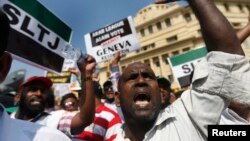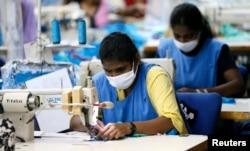European lawmakers said on Thursday they were disappointed about Sri Lanka's slow rollout of human rights reforms that the island nation had promised in exchange for trade concessions.
The European Union reinstated concessions on a series of products in May — after Sri Lanka said it would ratify 27 international conventions on rights, labor conditions, the environment and governance.
The island's key garments industry benefited the most from the duty reductions and other allowances offered by the EU's Generalised Scheme of Preferences Plus scheme.
But a European Parliament delegation said they had seen little progress more than five months after the agreement. There was no immediate comment from the government.
"It was noted that a number of important issues remain pending, in particular the revision of the Prevention of Terrorism Act on which the Prime Minister and other senior figures had given their personal assurances," the EU delegation said in a statement.
The United Nations has said Sri Lanka's current terrorism legislation allows the torture of detainees.
Sri Lanka originally lost the EU concession in 2010 after then-president Mahinda Rajapaksa rejected demands from the international community to address human rights abuses allegedly committed during a 2009 offensive to crush a Tamil insurgency.
Rajapaksa was ousted in January last year, and the EU agreed to reinstate the concessions after a new administration, led by President Maithripala Sirisena, promised to make changes.
The garments industry is Sri Lanka's second-biggest hard currency earner after remittances.
It boasts annual exports of around $5 billion and produces goods for Victoria's Secret, Tommy Hilfiger, Nike, Marks & Spencer and other well-known brands.






